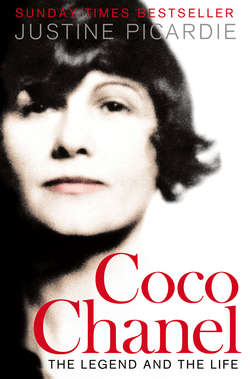Читать книгу Coco Chanel: The Legend and the Life - Justine Picardie - Страница 15
ОглавлениеThe Little Black Dress
In July 1918, an aristocratic beauty named Diana Wyndham wrote a letter to her friend Duff Cooper, from Beaufort Castle in Scotland, where she was visiting her sister Laura and enjoying balmy days in ‘a sea of bluebells, gorse and broom’. The youngest daughter of the fourth Lord Ribblesdale (a former government chief whip in the House of Lords), Diana Wyndham was possessed of connections that placed her at the heart of upper-class society. Her father’s portrait by John Singer Sargent reveals why King Edward VII admired him for his courtly stateliness (the king referred to Ribblesdale as ‘The Ancestor’, because of the impression he gave of having stepped out of an oil painting). Diana was 25, 10 years younger than Coco Chanel, but she had already been married, in 1913, and widowed the following year. Her first husband, often described as one of the handsomest men in London, was Percy Wyndham, half-brother to the Duke of Westminster. An officer in the Coldstream Guards at the time of their wedding, he was killed in action in France on 14th September 1914; his death was followed less than a year later by that of Diana’s brother.
‘Dearest Duff,’ she wrote to a man as well connected as herself, who had joined the Foreign Office after Eton and Oxford, and was currently serving in the Grenadier Guards, ‘Lots of things have happened since I saw you – I’ve been ill, we’ve nearly lost the war, and I think I’m going to marry Capel after all – so next time I see you, you’ll be staying with me in my luxurious apartment in the Avenue du Bois.’
Diana had had a brief flirtation with Duff Cooper three months previously, and so had no need to explain the family references that followed in her letter – to her sister Laura, who had married Simon Fraser, the 14th Lord Lovat, or to her aunt Margot Asquith, the wife of the former prime minister. But it appears she did want to justify her actions to Cooper, following the disapproving responses she had received from Margot Asquith and another of her aunts to her decision to marry Boy Capel. Diana had met the handsome captain while she was driving an ambulance for the Red Cross in France, close to the front line; and their relationship may have been more passionate than Coco Chanel preferred to admit. If Diana was not yet pregnant with Capel’s child when she wrote to Duff Cooper, she would have been soon afterwards, given the birth of her first baby the following April.
Not that an unplanned pregnancy was the cause of her aunts’ condemnation: they already had other grounds on which to object to Capel, which emerge in Diana’s letter to Cooper: ‘I wrote, the other day, to Lucy and Margot, breaking [to] them the news and have today received masterpieces from them – Lucy’s letter worse than a farewell dinner, saying her heart has never ceased aching since she received mine, that Paris did not lead to high ideals or morality, that it was selfish of me to marry and leave father, that he [Capel] was half French and not fond of country life, and Margot [wrote] much on the same lines, giving some well-aimed hits at the Versailles Council, since he [Capel] has become political secretary on the Council.’
